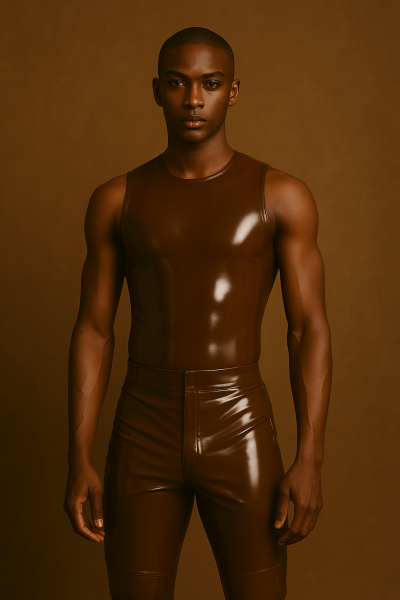BROWN
BROWN
“YOU GOT THE NERVE TO CALL ME COLORED”
A photo shoot that provokes, confronts, and refuses to stay silent.
Sven Appelt has once again found a pressure point — not to cause harm, but to expose, to reveal, to raise his voice when others remain quiet.
His latest shoot with Andreas Fux bears a title that forces conversation by its very existence:
“BROWN / YOU GOT THE NERVE TO CALL ME COLORED” – a provocative confrontation with color, identity, and the refined white man who may carry more color within him than he dares to admit.
This shoot is not an act of appropriation, but of reversal. What happens when a white man claims the color “brown” for himself? Not as disguise, not as costume, but as a statement — against political tension, against the fractures in our society, against the constant “us vs. them” that’s already embedded in the very fibers of reality.
Sven Appelt addresses the topic not as an outsider, but as someone who has witnessed change first-hand.
“I definitely wouldn’t want to be 20 years old today.”
A sentence that lingers — drawing a line between past and present.
When he was young — in the late ’90s and early 2000s — tolerance wasn’t a political buzzword. It was a lived reality. You were lesbian, gay, male or female – period. People played with roles, referred to each other as “she” or “he” without needing a manifesto. Identity was expression, not a straitjacket. And most importantly: there were no barriers between those who essentially wanted the same thing – freedom, equality, respect.
Today? Today Sven Appelt sees a society splitting itself apart. Xenophobia, migration debates, political radicalization – all unfolding in a queer scene that once stood for the opposite. Suddenly, boundaries are being drawn. Suddenly, it’s no longer a shared struggle but a competition over who can narrate the greater history of oppression.
And with that arises a question that won’t let go of him:
“Is this the right path? Or are we reinforcing exactly what has become so glaring in 2025?”
And more urgently: Who actually has the right to define other people?
What does it mean when a white man dares to call someone with brown or dark skin “colored”?
It is not a neutral description. It is a line drawn — a subtle yet powerful act of exclusion. A white man allows himself to place others in a category that leaves him untouched — as if he is the norm, and everything else a variation.
The word “colored” throws a veil over reality. It lumps everyone together – Asians, Latinos, South Africans, North Africans, Central Africans. A term that claims to celebrate diversity, but in truth, enforces sameness.
And yet, the white man remains untouched in this narrative. Unaffected.
He is not “colored.” He stays white.
And that is the real transgression:
The issue is not the word brown – it is the refusal to say it. The avoidance. The fear of naming what is visible.
Why can’t a brown woman simply be called a brown woman?
Why is a brown man not just a brown man?
True exclusion lies not in the direct expression, but in the euphemism — the distance that is created through language.
Because to be called “colored” is to be simultaneously separated from the white norm.
As if “brown” weren’t enough.
As if it required a softened, distanced term to keep the world comfortable for the white gaze.
This shoot won’t deliver answers – but it will provoke questions. Questions that are uncomfortable.
Questions that are too often bypassed.
It won’t be a quiet statement – it will be a mirror.
Because maybe it was never color that was the problem.
Maybe it was always the fear of truly seeing it.












